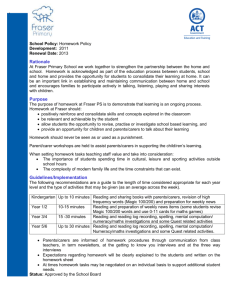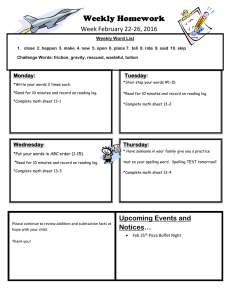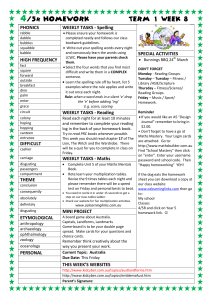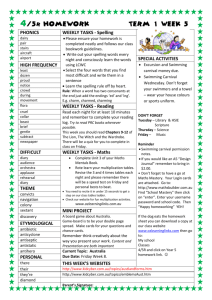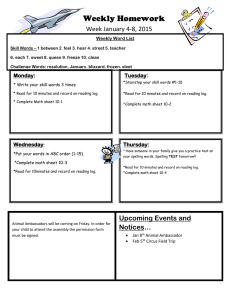SCHOOL POLICY FOR HOMEWORK
advertisement
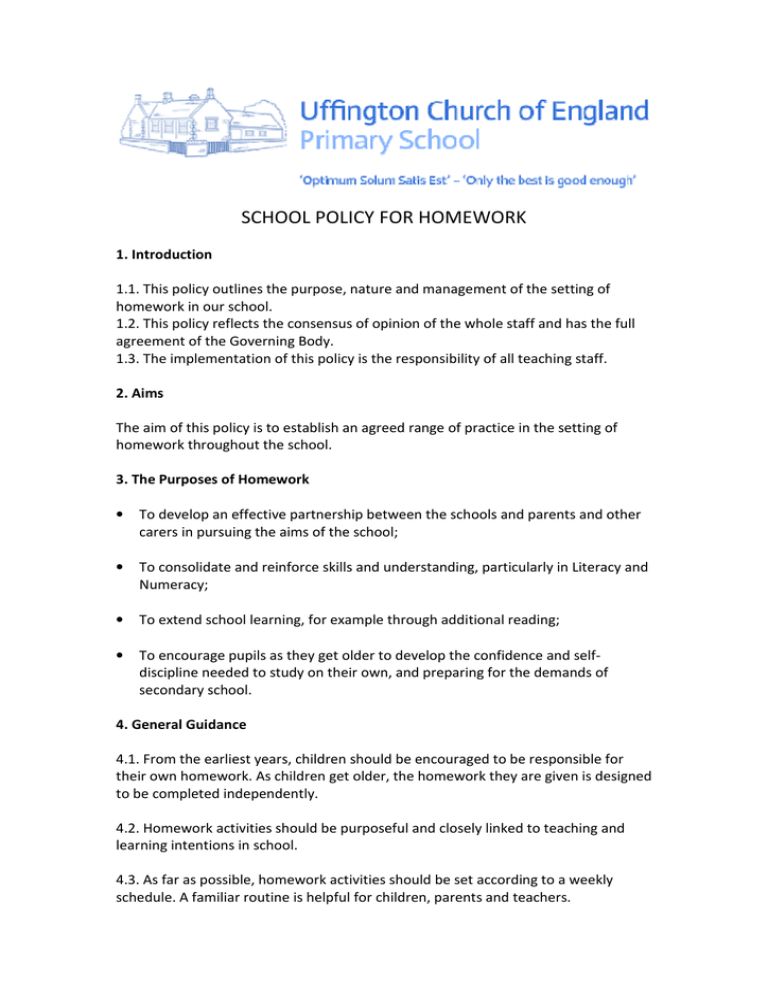
SCHOOL POLICY FOR HOMEWORK 1. Introduction 1.1. This policy outlines the purpose, nature and management of the setting of homework in our school. 1.2. This policy reflects the consensus of opinion of the whole staff and has the full agreement of the Governing Body. 1.3. The implementation of this policy is the responsibility of all teaching staff. 2. Aims The aim of this policy is to establish an agreed range of practice in the setting of homework throughout the school. 3. The Purposes of Homework • To develop an effective partnership between the schools and parents and other carers in pursuing the aims of the school; • To consolidate and reinforce skills and understanding, particularly in Literacy and Numeracy; • To extend school learning, for example through additional reading; • To encourage pupils as they get older to develop the confidence and selfdiscipline needed to study on their own, and preparing for the demands of secondary school. 4. General Guidance 4.1. From the earliest years, children should be encouraged to be responsible for their own homework. As children get older, the homework they are given is designed to be completed independently. 4.2. Homework activities should be purposeful and closely linked to teaching and learning intentions in school. 4.3. As far as possible, homework activities should be set according to a weekly schedule. A familiar routine is helpful for children, parents and teachers. 4.4. Homework activities should be differentiated according to ability. Some activities, especially in topic work, may be differentiated by expectation. 4.5. Homework should be marked regularly and in accordance with the school’s Marking Policy. Children should be given feedback on their homework as soon as possible. 4.6. It is not the school’s policy to set homework for children taking holidays during term time. 5. Time Allocations Homework at Uffington School is set in accordance with guidance from the Department for Education. The recommended time allocations for homework are as follows: • Years R, 1 and 2 – one hour a week • Years 3 and 4 – one and a half hours a week • Years 5 and 6 – thirty minutes a day 6. Reading Homework Regular reading is vital. For children in the infants, homework largely consists of reading but it is expected that regular home reading will continue throughout the school. All children are expected to take their reading book home every day and should try to complete some reading each night either on their own or with an adult. A Reading Diary is provided to keep a record of reading at home and parents are encouraged to sign the diary, making a comment if they wish, to show that reading homework has been completed. In addition to individual reading, children in Key Stage 2 may be asked to prepare a given piece for their weekly Guided Reading session. Children in Key Stage 1 may be asked to complete activities to support their work in Guided Reading. Reading targets are stuck into the reading diary to inform parents and carers of expectations in the different colour bands. 7. Spelling Homework In the Foundation Stage children are asked to complete an activity to support their learning of phonics. This work is recorded in their Letters and Sounds Books. Children are also given flashcards with sounds and words to practise. In Key Stage 1, a spelling list is given and tested on a weekly basis. In Key Stage 2, a spelling list linked to class activities is given for children to learn at home. The children are then given a spelling test in school. 8. Writing In Key Stage 1, writing tasks may be given as part of the rotating programme of homework activities (see guidance notes). In Key Stage 2, children are asked to complete a task linked to either their Guided Reading or Guided Writing (usually alternate weeks). This work is completed in their Literacy Homework folders. 9. Mathematics In the Foundation Stage suggestions for activities to support learning in mathematics are given on a weekly basis. Children in Key Stage 1 are given homework activities to consolidate number processes as part of the rotating programme of homework activities (see guidance notes). In Key Stage 2, children are given a weekly homework activity to consolidate and extend learning. 10. Other Homework Occasionally, children may be asked to do additional pieces of work to support current curriculum themes, e.g. topic research, diaries, surveys and work linked to individual learning programmes. 11. Working in Partnership with Parents and Carers All parents and carers are asked to sign a Home-School Agreement when their children are admitted to school. The agreement requires parents and carers to provide support and guidance for homework. The setting of homework is explained at the annual Curriculum Meetings held at the beginning of each academic year. Information about homework and suggestions for helping children at home are published on the school website. Teachers may provide additional guidance when homework is sent home. Topic webs for the EYFS and KS1 are sent home each term. Parents and children are always encouraged to approach the class teacher when there is a problem with homework. Feedback from parents and carers is always welcome. 12. Review The Headteacher and staff will review this policy biennially. Any suggested amendments will be presented to the Governing Body at their first meeting following review. Latest Review March 2014 Homework – A Guide for Parents The Role of Parents Research shows that by the age of seven there is a 30% difference in attainment between those who are supported with their homework and those who are not. We therefore value highly the support and guidance you provide for your children’s homework. The level of support you provide will depend upon the age of your child but as a rule, as children grow up, they should be able to complete homework independently. We would ask that you would always encourage your child to ‘have a go’ on their own first before intervening. Please remember that it is your child’s homework, not yours! Feedback on homework is always welcome; please feel free to add a note to let the teacher know how your child got on. Supporting Reading Home reading is the main form of homework at the primary stage and we would ask that, ideally, you hear your child read at least three times a week. If your child is struggling, try reading alternative pages so that your child can follow as you read. If your child comes across a word they cannot read, their first strategy should be to try to sound the word out. Picture cues may also help. In the Foundation Stage and Key Stage 1, many of the reading books have ideas for questions which you can ask your child. At Key Stage 2, ask your child questions about what they have read, encouraging them to use evidence from the text to support their answers. PLEASE REMEMBER TO SIGN YOUR CHILD’S READING DIARY! Example Homework Activities EYFS Phonics activities Flashcards with sounds and letters to practise Word walls Reading books Maths activities Key Stage 1 Reading Spellings Reading, Writing and Maths activities (rotating programme completed in red homework books) Key Stage 2 Reading Spellings Maths practice activities to consolidate learning in class Literacy activities, e.g. comprehension, writing sentences, word searches …………………………………………..
